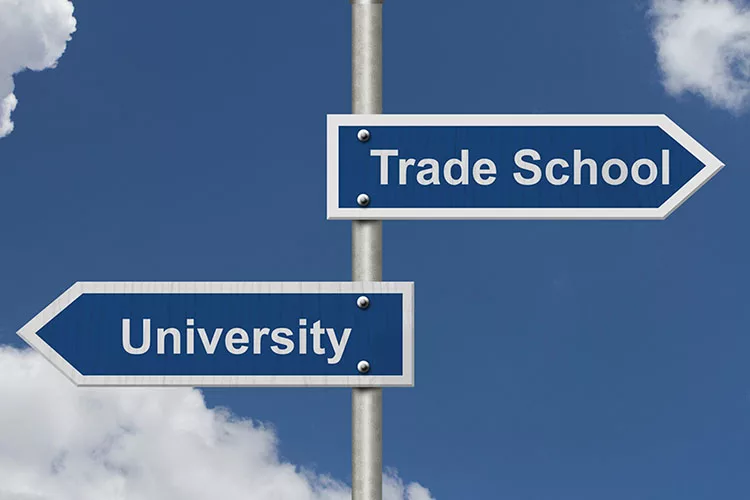To anoint higher education as a valuable investment would be a drastic understatement. Higher education is seen as a way to shape one’s future; in fact, many deem attending a four-year college or university the default pathway to success. However, in recent years, a shift has occurred in the attitude regarding what the road to success might look like for the coming generation.
Seeking higher education in any form is admirable. It leads to an abundance of opportunities that’d be incredibly difficult to access otherwise, and this is a huge part of why so many of us take the collegiate route. But what about trade school? Vocational or technical schools are an affordable and practical alternative to pursuing a degree through traditional means.
Most vocational schools provide specialized training in specific fields instead of creating a path of multiple courses, some of which have nothing to do with the focus of the student’s degree.
One of the many benefits of choosing a technical school is the focused and specialized training offered by the school’s programs. Not only are these programs designed to teach the essentials of each chosen path, but they focus heavily on hands-on skills necessary for students to thrive in their chosen profession.
Unlike the broad curriculum of a traditional college, trade schools focus extensively on practical, job-specific skills. Hands-on experience, often in the field, is generally the focus in a vocational school; preparing students to succeed in their selected field is the priority.
A monumental benefit of opting for trade school is the drastically lower cost. While most people who pursue a traditional four-year degree choose to take out student loans to cover the cost, vocational school is significantly more affordable and offers a much quicker return on investment. Most technical school programs can be completed in two years or less, which allows students to enter the workforce sooner and reap the benefits of their hard work.
The Bureau of Labor Statistics notes that there is a high demand for skilled workers in various trades such as health care, construction and technology — finding a job will not be a difficult task for a skilled worker (https://bit.ly/3v1AItr). Because many programs stress the importance of hands-on field experience, a considerable amount of program graduates are capable and competent and enter the workforce equipped with the skills needed to be successful.
In addition to the benefits of the growing need for workers, a large number of unions have already formed in the fields often entered by vocational school graduates (https://bit.ly/3GQeBc6).
Most trade schools offer benefits via connections with industry partners and employers. According to statistics from the Association for Career and Technical Education, many institutions can provide career placement, internships and apprenticeships, facilitating smoother transitions from education to employment (https://bit.ly/3TrOznf).
Stigmas Still Exist
So, what’s keeping people from rushing to grab a spot in a vocational school program? Why does a college acceptance letter mean so much more than a vocational school enrollment?
The truth is, there’s a stigma. Traditional colleges and universities are usually seen as more prestigious and academically rigorous compared with trade or vocational schools. There’s a societal sentiment that a college education is superior and leads to more reputable careers.
Jay Egg of Egg Geo had this to say on the topic: “As I was speaking with New York legislators, I told them that their promotion of the trades to get folks out in the field installing thermal energy networks is commendable. I will be impressed when they put as much weight on a journeyman license as they do on a professional engineering license.
“That means when these folks with journeyman licensees are of the age, they need to move to more white-collar jobs because their bodies are worn out. They need to be able to operate as an engineer in their chosen field of mechanical systems. When the United States and New York accept trade labor services as the same as college experience, then we will have bridged the gap between trades and college.”
In recent years, there has been a growing recognition of the vitality of vocational schooling and the need for skilled workers in various industries. Efforts to remove the stigma and boost the value of trade schools have been underway, underlining the practical skills gained and the potential for successful and rewarding careers in these fields.
Despite lingering stigma and a staggering lack of information, the reality is that both paths — college education and vocational training — have their merits and can lead to successful careers.
In the geothermal HVAC field, we need skilled workers who know what it means to work hard and learn in a hands-on environment. The disparity between the source of education, the time it takes to become qualified, and the stigma surrounding which institution is the catalyst for one’s learning is doing nothing but dividing the workforce.
A competent and knowledgeable workforce is urgently needed to meet the increasing demand for renewable and sustainable energy and maintain the growth of geothermal projects. This demand encompasses a range of positions, from technicians and drillers to engineers and researchers, who possess hands-on experience and expertise in geothermal energy production and maintenance.
At the end of the day, every contribution is valuable, whether it comes from the mind of a respected Ph.D. with years of research and experience or a freshly certified vocational student on his very first day on the job. White collar, blue collar, hard hat or construction vest, we’re all on the same team and in the same boat. It doesn’t matter which route we took to get here, only that we’re doing great things as an industry, undivided by prejudices or pride. l
Mimi Egg is a social media marketing professional, writer and media technical consultant for Egg Geo. She may be reached at [email protected].




